Leadership and Change Management Report: Aquarius Hotel Analysis
VerifiedAdded on 2023/01/17
|19
|4671
|58
Report
AI Summary
This report examines leadership and change management within the context of the Aquarius Hotel's refurbishment project. It begins with an executive summary, followed by an introduction that outlines the report's purpose, objectives, and structure. The report delves into various leadership styles, with a particular focus on participative leadership, and evaluates their applicability to the hotel's change program. It also explores organizational lifecycles using Greiner's Growth Model and analyzes organizational characteristics at different stages. Furthermore, the report identifies key stakeholders and potential barriers to change, utilizing Mendelow's power-interest grid for analysis. It also discusses the importance of effective communication in managing change. The report concludes with recommendations, suggesting that the Aquarius Hotel assess the impact of changes related to room redecoration and breakfast place renovation and highlights the need for further information regarding these impacts. The report utilizes academic theories such as transformational leadership theory, Greiner Growth Model, and organizational characteristics during four stages of life cycle to support its findings and recommendations.
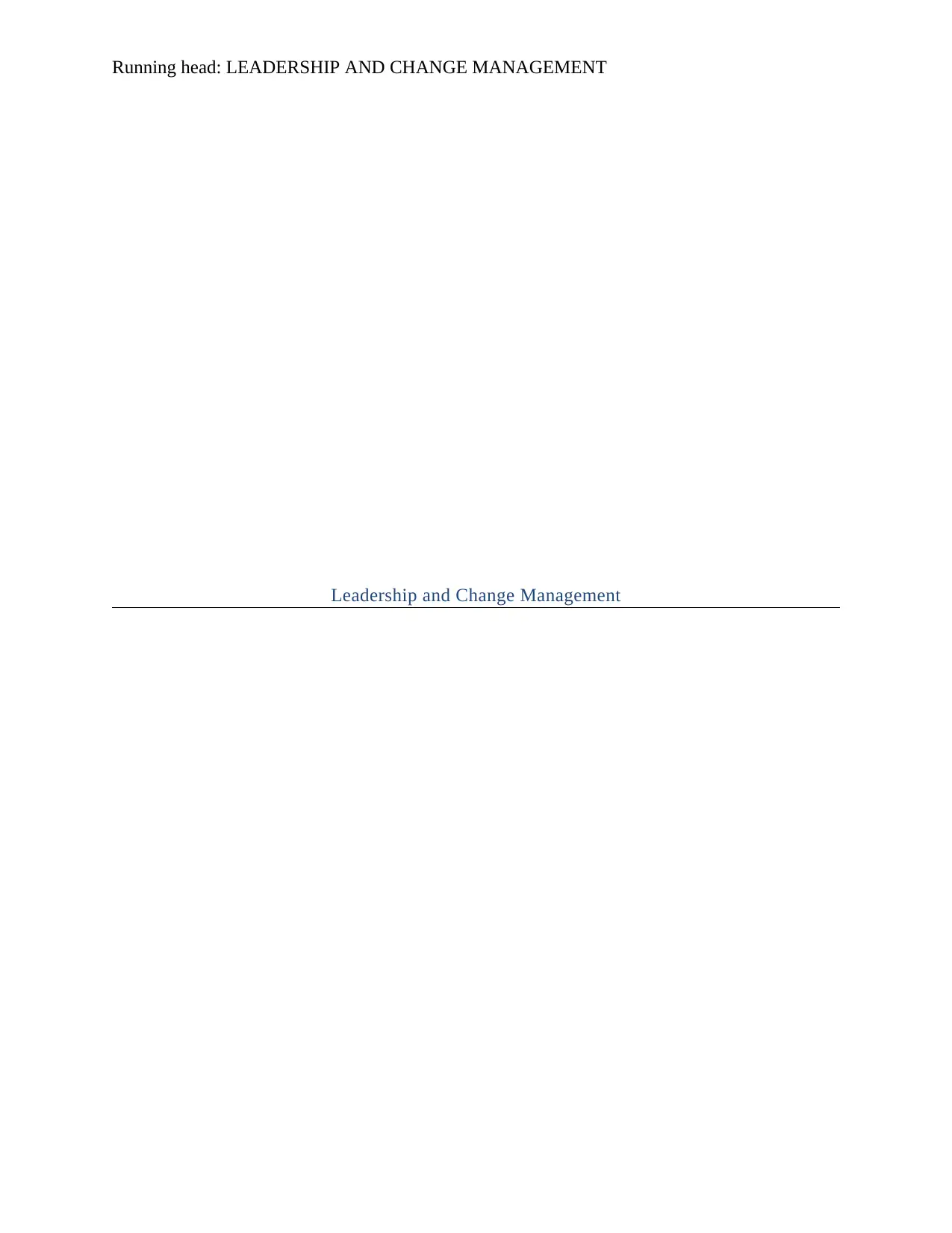
Running head: LEADERSHIP AND CHANGE MANAGEMENT
Leadership and Change Management
Leadership and Change Management
Paraphrase This Document
Need a fresh take? Get an instant paraphrase of this document with our AI Paraphraser
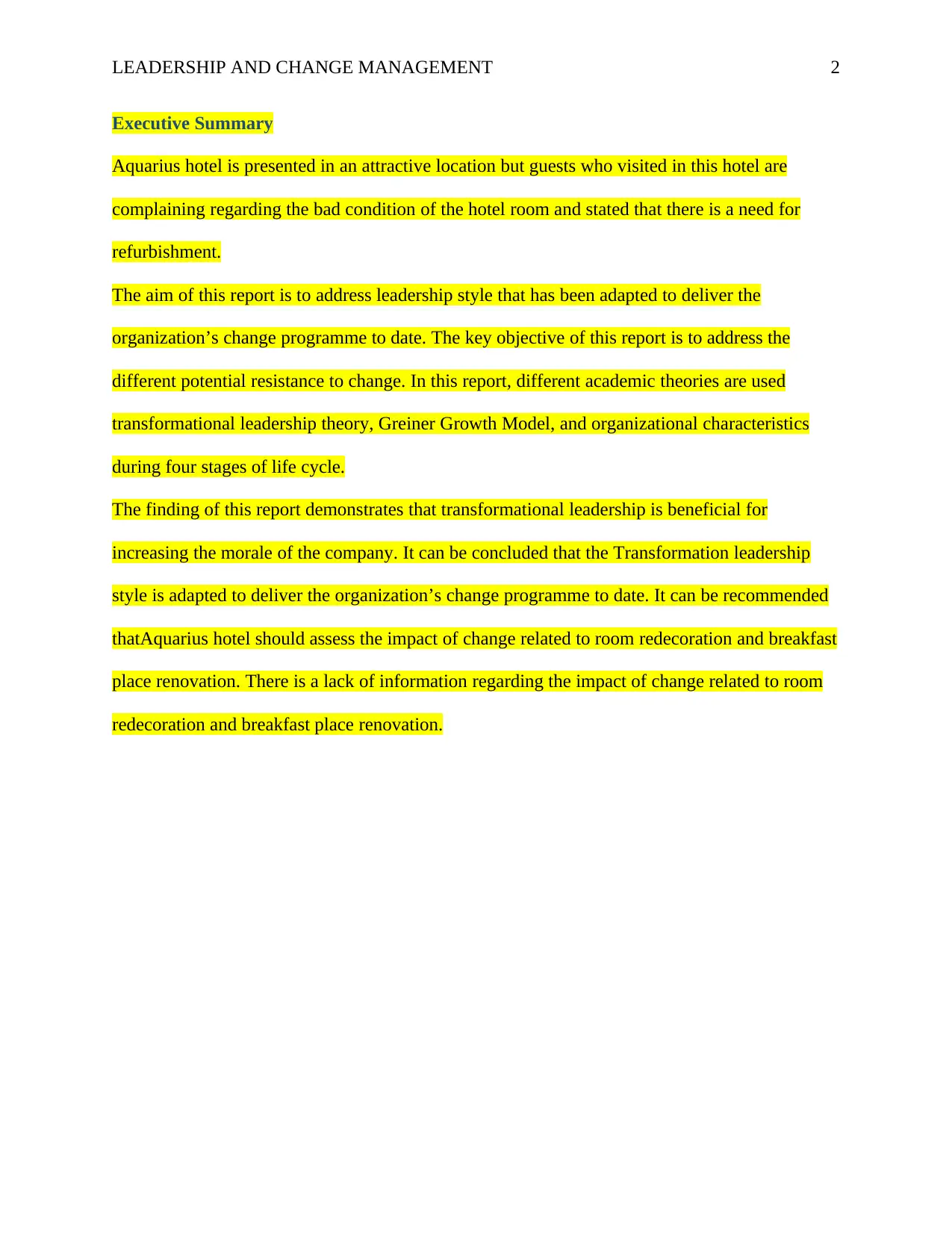
LEADERSHIP AND CHANGE MANAGEMENT 2
Executive Summary
Aquarius hotel is presented in an attractive location but guests who visited in this hotel are
complaining regarding the bad condition of the hotel room and stated that there is a need for
refurbishment.
The aim of this report is to address leadership style that has been adapted to deliver the
organization’s change programme to date. The key objective of this report is to address the
different potential resistance to change. In this report, different academic theories are used
transformational leadership theory, Greiner Growth Model, and organizational characteristics
during four stages of life cycle.
The finding of this report demonstrates that transformational leadership is beneficial for
increasing the morale of the company. It can be concluded that the Transformation leadership
style is adapted to deliver the organization’s change programme to date. It can be recommended
thatAquarius hotel should assess the impact of change related to room redecoration and breakfast
place renovation. There is a lack of information regarding the impact of change related to room
redecoration and breakfast place renovation.
Executive Summary
Aquarius hotel is presented in an attractive location but guests who visited in this hotel are
complaining regarding the bad condition of the hotel room and stated that there is a need for
refurbishment.
The aim of this report is to address leadership style that has been adapted to deliver the
organization’s change programme to date. The key objective of this report is to address the
different potential resistance to change. In this report, different academic theories are used
transformational leadership theory, Greiner Growth Model, and organizational characteristics
during four stages of life cycle.
The finding of this report demonstrates that transformational leadership is beneficial for
increasing the morale of the company. It can be concluded that the Transformation leadership
style is adapted to deliver the organization’s change programme to date. It can be recommended
thatAquarius hotel should assess the impact of change related to room redecoration and breakfast
place renovation. There is a lack of information regarding the impact of change related to room
redecoration and breakfast place renovation.
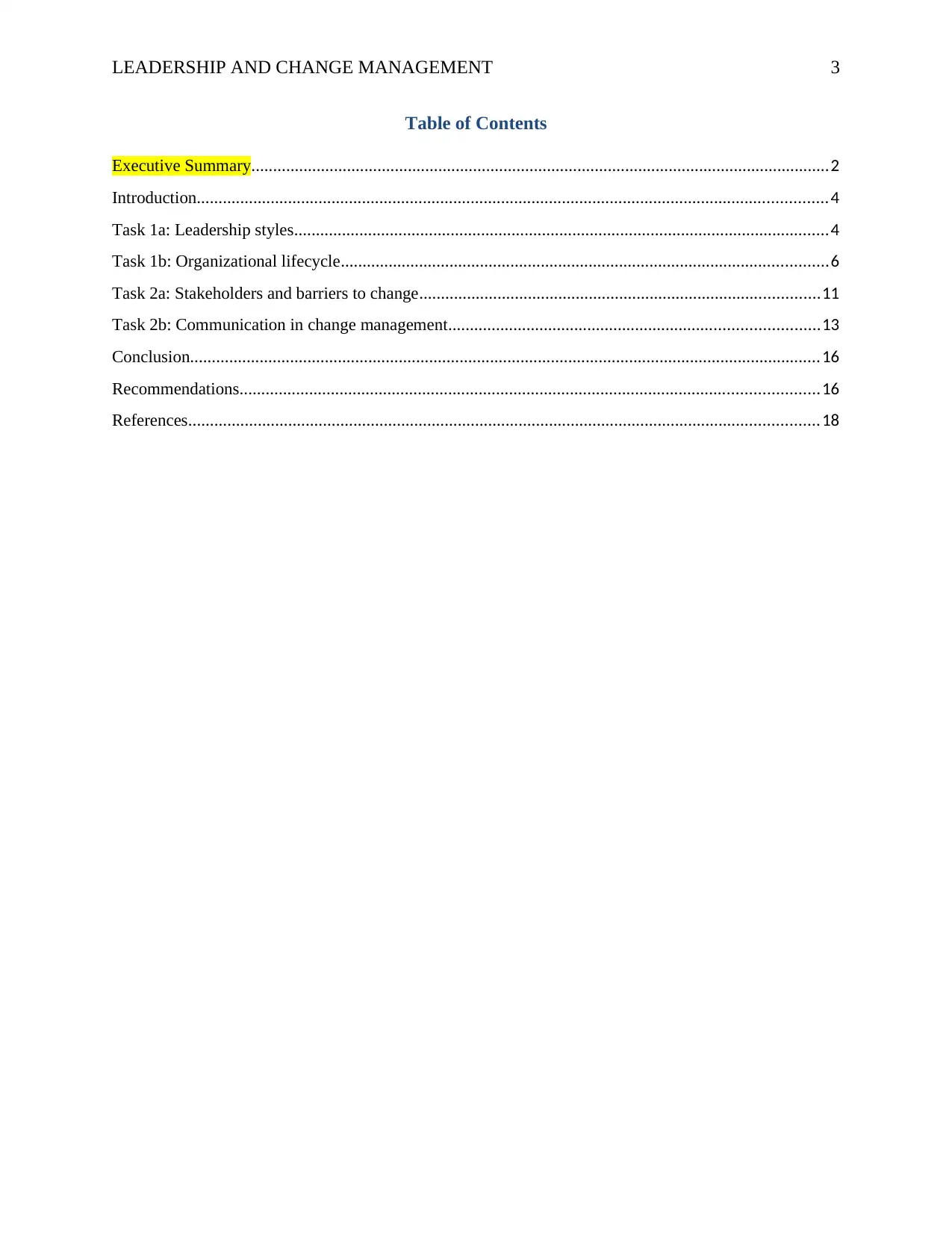
LEADERSHIP AND CHANGE MANAGEMENT 3
Table of Contents
Executive Summary.....................................................................................................................................2
Introduction.................................................................................................................................................4
Task 1a: Leadership styles...........................................................................................................................4
Task 1b: Organizational lifecycle................................................................................................................6
Task 2a: Stakeholders and barriers to change............................................................................................11
Task 2b: Communication in change management.....................................................................................13
Conclusion.................................................................................................................................................16
Recommendations.....................................................................................................................................16
References.................................................................................................................................................18
Table of Contents
Executive Summary.....................................................................................................................................2
Introduction.................................................................................................................................................4
Task 1a: Leadership styles...........................................................................................................................4
Task 1b: Organizational lifecycle................................................................................................................6
Task 2a: Stakeholders and barriers to change............................................................................................11
Task 2b: Communication in change management.....................................................................................13
Conclusion.................................................................................................................................................16
Recommendations.....................................................................................................................................16
References.................................................................................................................................................18
⊘ This is a preview!⊘
Do you want full access?
Subscribe today to unlock all pages.

Trusted by 1+ million students worldwide
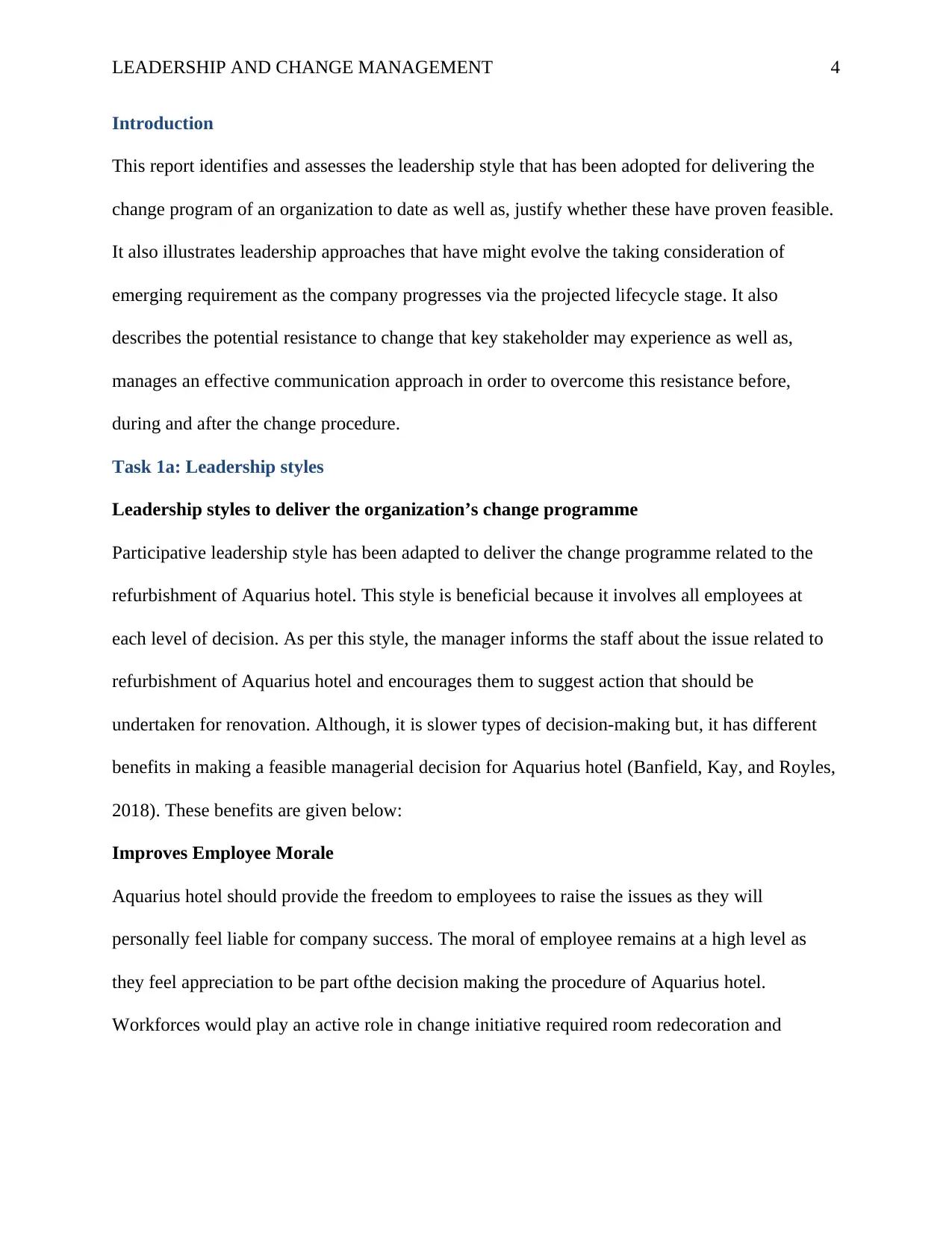
LEADERSHIP AND CHANGE MANAGEMENT 4
Introduction
This report identifies and assesses the leadership style that has been adopted for delivering the
change program of an organization to date as well as, justify whether these have proven feasible.
It also illustrates leadership approaches that have might evolve the taking consideration of
emerging requirement as the company progresses via the projected lifecycle stage. It also
describes the potential resistance to change that key stakeholder may experience as well as,
manages an effective communication approach in order to overcome this resistance before,
during and after the change procedure.
Task 1a: Leadership styles
Leadership styles to deliver the organization’s change programme
Participative leadership style has been adapted to deliver the change programme related to the
refurbishment of Aquarius hotel. This style is beneficial because it involves all employees at
each level of decision. As per this style, the manager informs the staff about the issue related to
refurbishment of Aquarius hotel and encourages them to suggest action that should be
undertaken for renovation. Although, it is slower types of decision-making but, it has different
benefits in making a feasible managerial decision for Aquarius hotel (Banfield, Kay, and Royles,
2018). These benefits are given below:
Improves Employee Morale
Aquarius hotel should provide the freedom to employees to raise the issues as they will
personally feel liable for company success. The moral of employee remains at a high level as
they feel appreciation to be part ofthe decision making the procedure of Aquarius hotel.
Workforces would play an active role in change initiative required room redecoration and
Introduction
This report identifies and assesses the leadership style that has been adopted for delivering the
change program of an organization to date as well as, justify whether these have proven feasible.
It also illustrates leadership approaches that have might evolve the taking consideration of
emerging requirement as the company progresses via the projected lifecycle stage. It also
describes the potential resistance to change that key stakeholder may experience as well as,
manages an effective communication approach in order to overcome this resistance before,
during and after the change procedure.
Task 1a: Leadership styles
Leadership styles to deliver the organization’s change programme
Participative leadership style has been adapted to deliver the change programme related to the
refurbishment of Aquarius hotel. This style is beneficial because it involves all employees at
each level of decision. As per this style, the manager informs the staff about the issue related to
refurbishment of Aquarius hotel and encourages them to suggest action that should be
undertaken for renovation. Although, it is slower types of decision-making but, it has different
benefits in making a feasible managerial decision for Aquarius hotel (Banfield, Kay, and Royles,
2018). These benefits are given below:
Improves Employee Morale
Aquarius hotel should provide the freedom to employees to raise the issues as they will
personally feel liable for company success. The moral of employee remains at a high level as
they feel appreciation to be part ofthe decision making the procedure of Aquarius hotel.
Workforces would play an active role in change initiative required room redecoration and
Paraphrase This Document
Need a fresh take? Get an instant paraphrase of this document with our AI Paraphraser
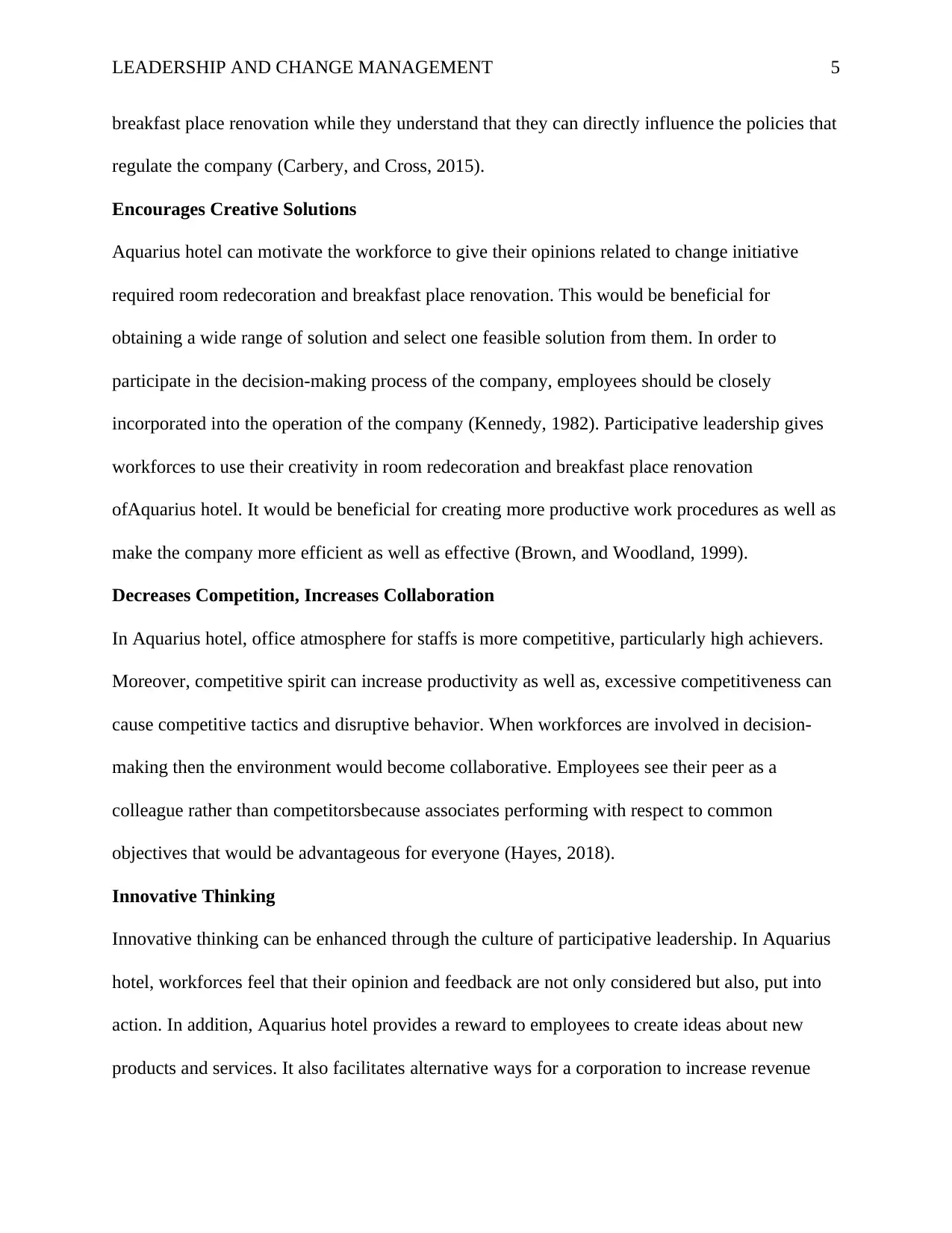
LEADERSHIP AND CHANGE MANAGEMENT 5
breakfast place renovation while they understand that they can directly influence the policies that
regulate the company (Carbery, and Cross, 2015).
Encourages Creative Solutions
Aquarius hotel can motivate the workforce to give their opinions related to change initiative
required room redecoration and breakfast place renovation. This would be beneficial for
obtaining a wide range of solution and select one feasible solution from them. In order to
participate in the decision-making process of the company, employees should be closely
incorporated into the operation of the company (Kennedy, 1982). Participative leadership gives
workforces to use their creativity in room redecoration and breakfast place renovation
ofAquarius hotel. It would be beneficial for creating more productive work procedures as well as
make the company more efficient as well as effective (Brown, and Woodland, 1999).
Decreases Competition, Increases Collaboration
In Aquarius hotel, office atmosphere for staffs is more competitive, particularly high achievers.
Moreover, competitive spirit can increase productivity as well as, excessive competitiveness can
cause competitive tactics and disruptive behavior. When workforces are involved in decision-
making then the environment would become collaborative. Employees see their peer as a
colleague rather than competitorsbecause associates performing with respect to common
objectives that would be advantageous for everyone (Hayes, 2018).
Innovative Thinking
Innovative thinking can be enhanced through the culture of participative leadership. In Aquarius
hotel, workforces feel that their opinion and feedback are not only considered but also, put into
action. In addition, Aquarius hotel provides a reward to employees to create ideas about new
products and services. It also facilitates alternative ways for a corporation to increase revenue
breakfast place renovation while they understand that they can directly influence the policies that
regulate the company (Carbery, and Cross, 2015).
Encourages Creative Solutions
Aquarius hotel can motivate the workforce to give their opinions related to change initiative
required room redecoration and breakfast place renovation. This would be beneficial for
obtaining a wide range of solution and select one feasible solution from them. In order to
participate in the decision-making process of the company, employees should be closely
incorporated into the operation of the company (Kennedy, 1982). Participative leadership gives
workforces to use their creativity in room redecoration and breakfast place renovation
ofAquarius hotel. It would be beneficial for creating more productive work procedures as well as
make the company more efficient as well as effective (Brown, and Woodland, 1999).
Decreases Competition, Increases Collaboration
In Aquarius hotel, office atmosphere for staffs is more competitive, particularly high achievers.
Moreover, competitive spirit can increase productivity as well as, excessive competitiveness can
cause competitive tactics and disruptive behavior. When workforces are involved in decision-
making then the environment would become collaborative. Employees see their peer as a
colleague rather than competitorsbecause associates performing with respect to common
objectives that would be advantageous for everyone (Hayes, 2018).
Innovative Thinking
Innovative thinking can be enhanced through the culture of participative leadership. In Aquarius
hotel, workforces feel that their opinion and feedback are not only considered but also, put into
action. In addition, Aquarius hotel provides a reward to employees to create ideas about new
products and services. It also facilitates alternative ways for a corporation to increase revenue
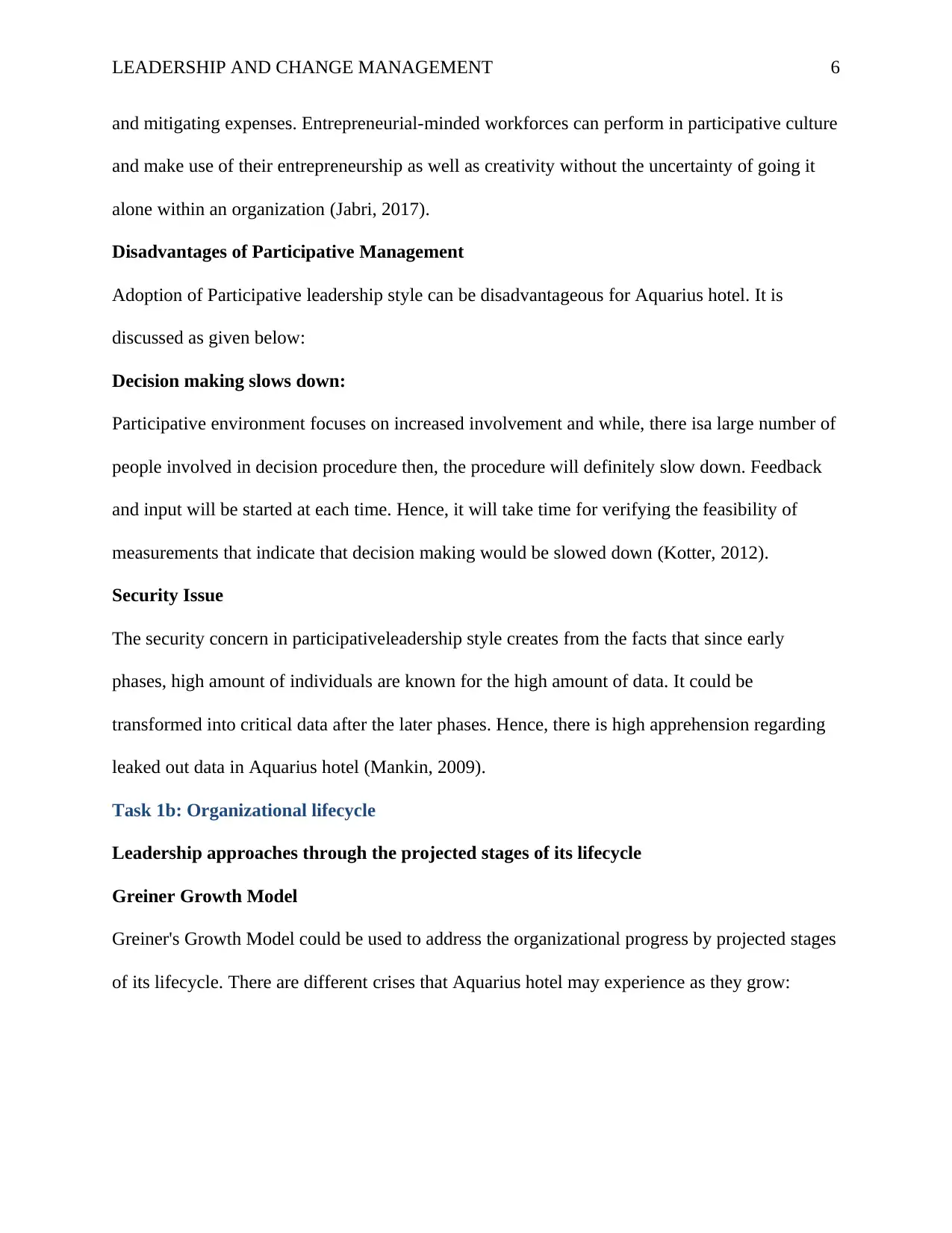
LEADERSHIP AND CHANGE MANAGEMENT 6
and mitigating expenses. Entrepreneurial-minded workforces can perform in participative culture
and make use of their entrepreneurship as well as creativity without the uncertainty of going it
alone within an organization (Jabri, 2017).
Disadvantages of Participative Management
Adoption of Participative leadership style can be disadvantageous for Aquarius hotel. It is
discussed as given below:
Decision making slows down:
Participative environment focuses on increased involvement and while, there isa large number of
people involved in decision procedure then, the procedure will definitely slow down. Feedback
and input will be started at each time. Hence, it will take time for verifying the feasibility of
measurements that indicate that decision making would be slowed down (Kotter, 2012).
Security Issue
The security concern in participativeleadership style creates from the facts that since early
phases, high amount of individuals are known for the high amount of data. It could be
transformed into critical data after the later phases. Hence, there is high apprehension regarding
leaked out data in Aquarius hotel (Mankin, 2009).
Task 1b: Organizational lifecycle
Leadership approaches through the projected stages of its lifecycle
Greiner Growth Model
Greiner's Growth Model could be used to address the organizational progress by projected stages
of its lifecycle. There are different crises that Aquarius hotel may experience as they grow:
and mitigating expenses. Entrepreneurial-minded workforces can perform in participative culture
and make use of their entrepreneurship as well as creativity without the uncertainty of going it
alone within an organization (Jabri, 2017).
Disadvantages of Participative Management
Adoption of Participative leadership style can be disadvantageous for Aquarius hotel. It is
discussed as given below:
Decision making slows down:
Participative environment focuses on increased involvement and while, there isa large number of
people involved in decision procedure then, the procedure will definitely slow down. Feedback
and input will be started at each time. Hence, it will take time for verifying the feasibility of
measurements that indicate that decision making would be slowed down (Kotter, 2012).
Security Issue
The security concern in participativeleadership style creates from the facts that since early
phases, high amount of individuals are known for the high amount of data. It could be
transformed into critical data after the later phases. Hence, there is high apprehension regarding
leaked out data in Aquarius hotel (Mankin, 2009).
Task 1b: Organizational lifecycle
Leadership approaches through the projected stages of its lifecycle
Greiner Growth Model
Greiner's Growth Model could be used to address the organizational progress by projected stages
of its lifecycle. There are different crises that Aquarius hotel may experience as they grow:
⊘ This is a preview!⊘
Do you want full access?
Subscribe today to unlock all pages.

Trusted by 1+ million students worldwide
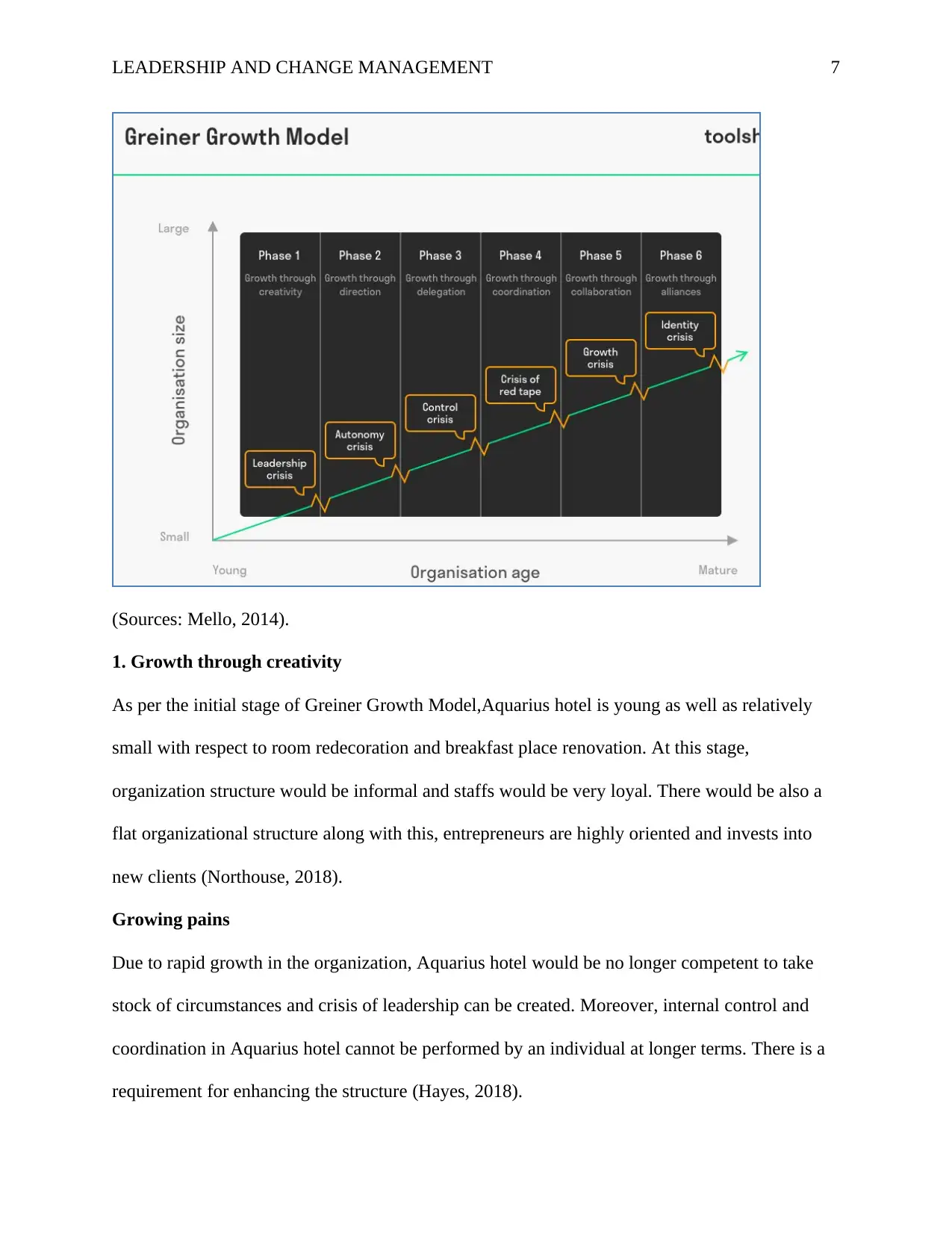
LEADERSHIP AND CHANGE MANAGEMENT 7
(Sources: Mello, 2014).
1. Growth through creativity
As per the initial stage of Greiner Growth Model,Aquarius hotel is young as well as relatively
small with respect to room redecoration and breakfast place renovation. At this stage,
organization structure would be informal and staffs would be very loyal. There would be also a
flat organizational structure along with this, entrepreneurs are highly oriented and invests into
new clients (Northouse, 2018).
Growing pains
Due to rapid growth in the organization, Aquarius hotel would be no longer competent to take
stock of circumstances and crisis of leadership can be created. Moreover, internal control and
coordination in Aquarius hotel cannot be performed by an individual at longer terms. There is a
requirement for enhancing the structure (Hayes, 2018).
(Sources: Mello, 2014).
1. Growth through creativity
As per the initial stage of Greiner Growth Model,Aquarius hotel is young as well as relatively
small with respect to room redecoration and breakfast place renovation. At this stage,
organization structure would be informal and staffs would be very loyal. There would be also a
flat organizational structure along with this, entrepreneurs are highly oriented and invests into
new clients (Northouse, 2018).
Growing pains
Due to rapid growth in the organization, Aquarius hotel would be no longer competent to take
stock of circumstances and crisis of leadership can be created. Moreover, internal control and
coordination in Aquarius hotel cannot be performed by an individual at longer terms. There is a
requirement for enhancing the structure (Hayes, 2018).
Paraphrase This Document
Need a fresh take? Get an instant paraphrase of this document with our AI Paraphraser
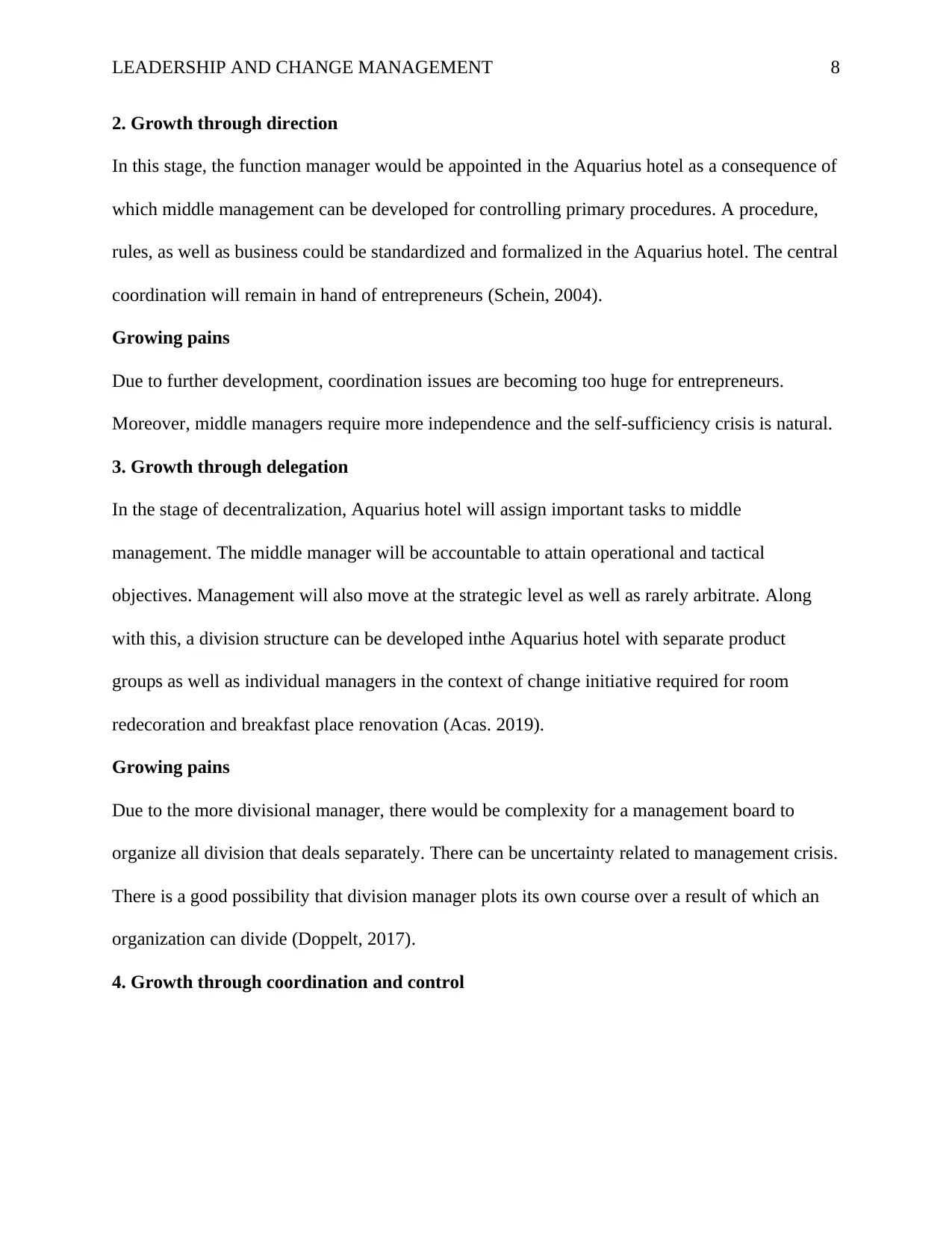
LEADERSHIP AND CHANGE MANAGEMENT 8
2. Growth through direction
In this stage, the function manager would be appointed in the Aquarius hotel as a consequence of
which middle management can be developed for controlling primary procedures. A procedure,
rules, as well as business could be standardized and formalized in the Aquarius hotel. The central
coordination will remain in hand of entrepreneurs (Schein, 2004).
Growing pains
Due to further development, coordination issues are becoming too huge for entrepreneurs.
Moreover, middle managers require more independence and the self-sufficiency crisis is natural.
3. Growth through delegation
In the stage of decentralization, Aquarius hotel will assign important tasks to middle
management. The middle manager will be accountable to attain operational and tactical
objectives. Management will also move at the strategic level as well as rarely arbitrate. Along
with this, a division structure can be developed inthe Aquarius hotel with separate product
groups as well as individual managers in the context of change initiative required for room
redecoration and breakfast place renovation (Acas. 2019).
Growing pains
Due to the more divisional manager, there would be complexity for a management board to
organize all division that deals separately. There can be uncertainty related to management crisis.
There is a good possibility that division manager plots its own course over a result of which an
organization can divide (Doppelt, 2017).
4. Growth through coordination and control
2. Growth through direction
In this stage, the function manager would be appointed in the Aquarius hotel as a consequence of
which middle management can be developed for controlling primary procedures. A procedure,
rules, as well as business could be standardized and formalized in the Aquarius hotel. The central
coordination will remain in hand of entrepreneurs (Schein, 2004).
Growing pains
Due to further development, coordination issues are becoming too huge for entrepreneurs.
Moreover, middle managers require more independence and the self-sufficiency crisis is natural.
3. Growth through delegation
In the stage of decentralization, Aquarius hotel will assign important tasks to middle
management. The middle manager will be accountable to attain operational and tactical
objectives. Management will also move at the strategic level as well as rarely arbitrate. Along
with this, a division structure can be developed inthe Aquarius hotel with separate product
groups as well as individual managers in the context of change initiative required for room
redecoration and breakfast place renovation (Acas. 2019).
Growing pains
Due to the more divisional manager, there would be complexity for a management board to
organize all division that deals separately. There can be uncertainty related to management crisis.
There is a good possibility that division manager plots its own course over a result of which an
organization can divide (Doppelt, 2017).
4. Growth through coordination and control
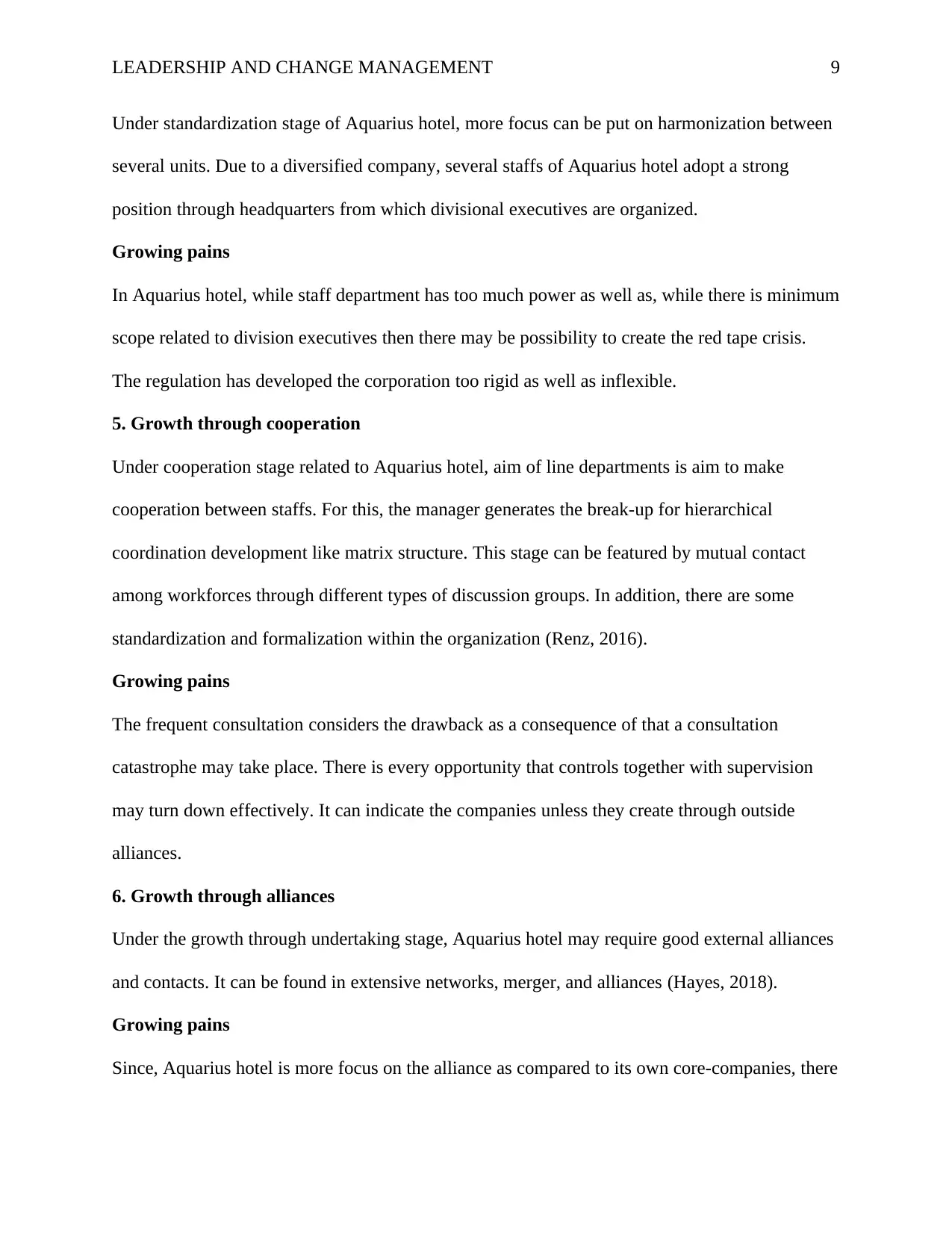
LEADERSHIP AND CHANGE MANAGEMENT 9
Under standardization stage of Aquarius hotel, more focus can be put on harmonization between
several units. Due to a diversified company, several staffs of Aquarius hotel adopt a strong
position through headquarters from which divisional executives are organized.
Growing pains
In Aquarius hotel, while staff department has too much power as well as, while there is minimum
scope related to division executives then there may be possibility to create the red tape crisis.
The regulation has developed the corporation too rigid as well as inflexible.
5. Growth through cooperation
Under cooperation stage related to Aquarius hotel, aim of line departments is aim to make
cooperation between staffs. For this, the manager generates the break-up for hierarchical
coordination development like matrix structure. This stage can be featured by mutual contact
among workforces through different types of discussion groups. In addition, there are some
standardization and formalization within the organization (Renz, 2016).
Growing pains
The frequent consultation considers the drawback as a consequence of that a consultation
catastrophe may take place. There is every opportunity that controls together with supervision
may turn down effectively. It can indicate the companies unless they create through outside
alliances.
6. Growth through alliances
Under the growth through undertaking stage, Aquarius hotel may require good external alliances
and contacts. It can be found in extensive networks, merger, and alliances (Hayes, 2018).
Growing pains
Since, Aquarius hotel is more focus on the alliance as compared to its own core-companies, there
Under standardization stage of Aquarius hotel, more focus can be put on harmonization between
several units. Due to a diversified company, several staffs of Aquarius hotel adopt a strong
position through headquarters from which divisional executives are organized.
Growing pains
In Aquarius hotel, while staff department has too much power as well as, while there is minimum
scope related to division executives then there may be possibility to create the red tape crisis.
The regulation has developed the corporation too rigid as well as inflexible.
5. Growth through cooperation
Under cooperation stage related to Aquarius hotel, aim of line departments is aim to make
cooperation between staffs. For this, the manager generates the break-up for hierarchical
coordination development like matrix structure. This stage can be featured by mutual contact
among workforces through different types of discussion groups. In addition, there are some
standardization and formalization within the organization (Renz, 2016).
Growing pains
The frequent consultation considers the drawback as a consequence of that a consultation
catastrophe may take place. There is every opportunity that controls together with supervision
may turn down effectively. It can indicate the companies unless they create through outside
alliances.
6. Growth through alliances
Under the growth through undertaking stage, Aquarius hotel may require good external alliances
and contacts. It can be found in extensive networks, merger, and alliances (Hayes, 2018).
Growing pains
Since, Aquarius hotel is more focus on the alliance as compared to its own core-companies, there
⊘ This is a preview!⊘
Do you want full access?
Subscribe today to unlock all pages.

Trusted by 1+ million students worldwide
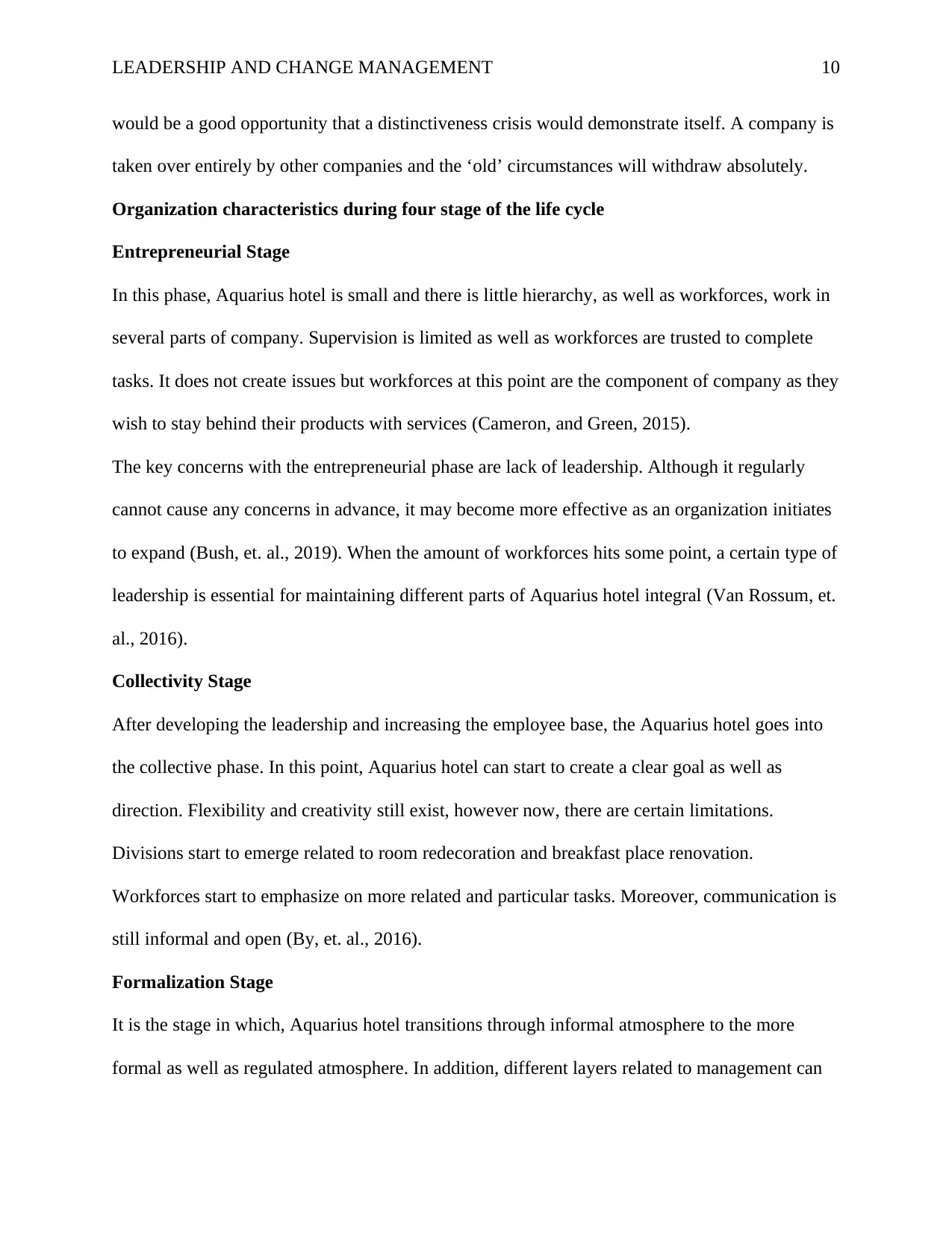
LEADERSHIP AND CHANGE MANAGEMENT 10
would be a good opportunity that a distinctiveness crisis would demonstrate itself. A company is
taken over entirely by other companies and the ‘old’ circumstances will withdraw absolutely.
Organization characteristics during four stage of the life cycle
Entrepreneurial Stage
In this phase, Aquarius hotel is small and there is little hierarchy, as well as workforces, work in
several parts of company. Supervision is limited as well as workforces are trusted to complete
tasks. It does not create issues but workforces at this point are the component of company as they
wish to stay behind their products with services (Cameron, and Green, 2015).
The key concerns with the entrepreneurial phase are lack of leadership. Although it regularly
cannot cause any concerns in advance, it may become more effective as an organization initiates
to expand (Bush, et. al., 2019). When the amount of workforces hits some point, a certain type of
leadership is essential for maintaining different parts of Aquarius hotel integral (Van Rossum, et.
al., 2016).
Collectivity Stage
After developing the leadership and increasing the employee base, the Aquarius hotel goes into
the collective phase. In this point, Aquarius hotel can start to create a clear goal as well as
direction. Flexibility and creativity still exist, however now, there are certain limitations.
Divisions start to emerge related to room redecoration and breakfast place renovation.
Workforces start to emphasize on more related and particular tasks. Moreover, communication is
still informal and open (By, et. al., 2016).
Formalization Stage
It is the stage in which, Aquarius hotel transitions through informal atmosphere to the more
formal as well as regulated atmosphere. In addition, different layers related to management can
would be a good opportunity that a distinctiveness crisis would demonstrate itself. A company is
taken over entirely by other companies and the ‘old’ circumstances will withdraw absolutely.
Organization characteristics during four stage of the life cycle
Entrepreneurial Stage
In this phase, Aquarius hotel is small and there is little hierarchy, as well as workforces, work in
several parts of company. Supervision is limited as well as workforces are trusted to complete
tasks. It does not create issues but workforces at this point are the component of company as they
wish to stay behind their products with services (Cameron, and Green, 2015).
The key concerns with the entrepreneurial phase are lack of leadership. Although it regularly
cannot cause any concerns in advance, it may become more effective as an organization initiates
to expand (Bush, et. al., 2019). When the amount of workforces hits some point, a certain type of
leadership is essential for maintaining different parts of Aquarius hotel integral (Van Rossum, et.
al., 2016).
Collectivity Stage
After developing the leadership and increasing the employee base, the Aquarius hotel goes into
the collective phase. In this point, Aquarius hotel can start to create a clear goal as well as
direction. Flexibility and creativity still exist, however now, there are certain limitations.
Divisions start to emerge related to room redecoration and breakfast place renovation.
Workforces start to emphasize on more related and particular tasks. Moreover, communication is
still informal and open (By, et. al., 2016).
Formalization Stage
It is the stage in which, Aquarius hotel transitions through informal atmosphere to the more
formal as well as regulated atmosphere. In addition, different layers related to management can
Paraphrase This Document
Need a fresh take? Get an instant paraphrase of this document with our AI Paraphraser
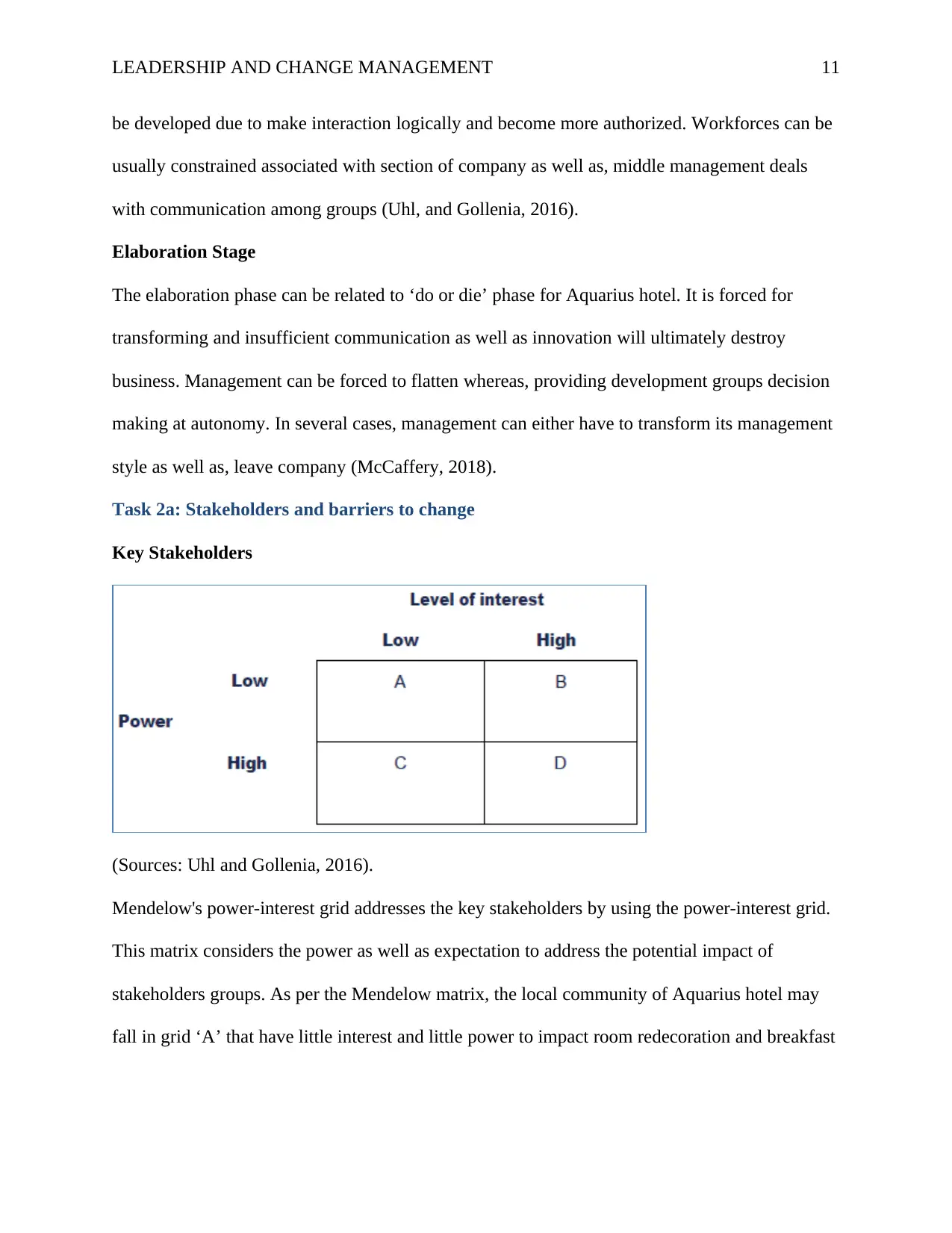
LEADERSHIP AND CHANGE MANAGEMENT 11
be developed due to make interaction logically and become more authorized. Workforces can be
usually constrained associated with section of company as well as, middle management deals
with communication among groups (Uhl, and Gollenia, 2016).
Elaboration Stage
The elaboration phase can be related to ‘do or die’ phase for Aquarius hotel. It is forced for
transforming and insufficient communication as well as innovation will ultimately destroy
business. Management can be forced to flatten whereas, providing development groups decision
making at autonomy. In several cases, management can either have to transform its management
style as well as, leave company (McCaffery, 2018).
Task 2a: Stakeholders and barriers to change
Key Stakeholders
(Sources: Uhl and Gollenia, 2016).
Mendelow's power-interest grid addresses the key stakeholders by using the power-interest grid.
This matrix considers the power as well as expectation to address the potential impact of
stakeholders groups. As per the Mendelow matrix, the local community of Aquarius hotel may
fall in grid ‘A’ that have little interest and little power to impact room redecoration and breakfast
be developed due to make interaction logically and become more authorized. Workforces can be
usually constrained associated with section of company as well as, middle management deals
with communication among groups (Uhl, and Gollenia, 2016).
Elaboration Stage
The elaboration phase can be related to ‘do or die’ phase for Aquarius hotel. It is forced for
transforming and insufficient communication as well as innovation will ultimately destroy
business. Management can be forced to flatten whereas, providing development groups decision
making at autonomy. In several cases, management can either have to transform its management
style as well as, leave company (McCaffery, 2018).
Task 2a: Stakeholders and barriers to change
Key Stakeholders
(Sources: Uhl and Gollenia, 2016).
Mendelow's power-interest grid addresses the key stakeholders by using the power-interest grid.
This matrix considers the power as well as expectation to address the potential impact of
stakeholders groups. As per the Mendelow matrix, the local community of Aquarius hotel may
fall in grid ‘A’ that have little interest and little power to impact room redecoration and breakfast
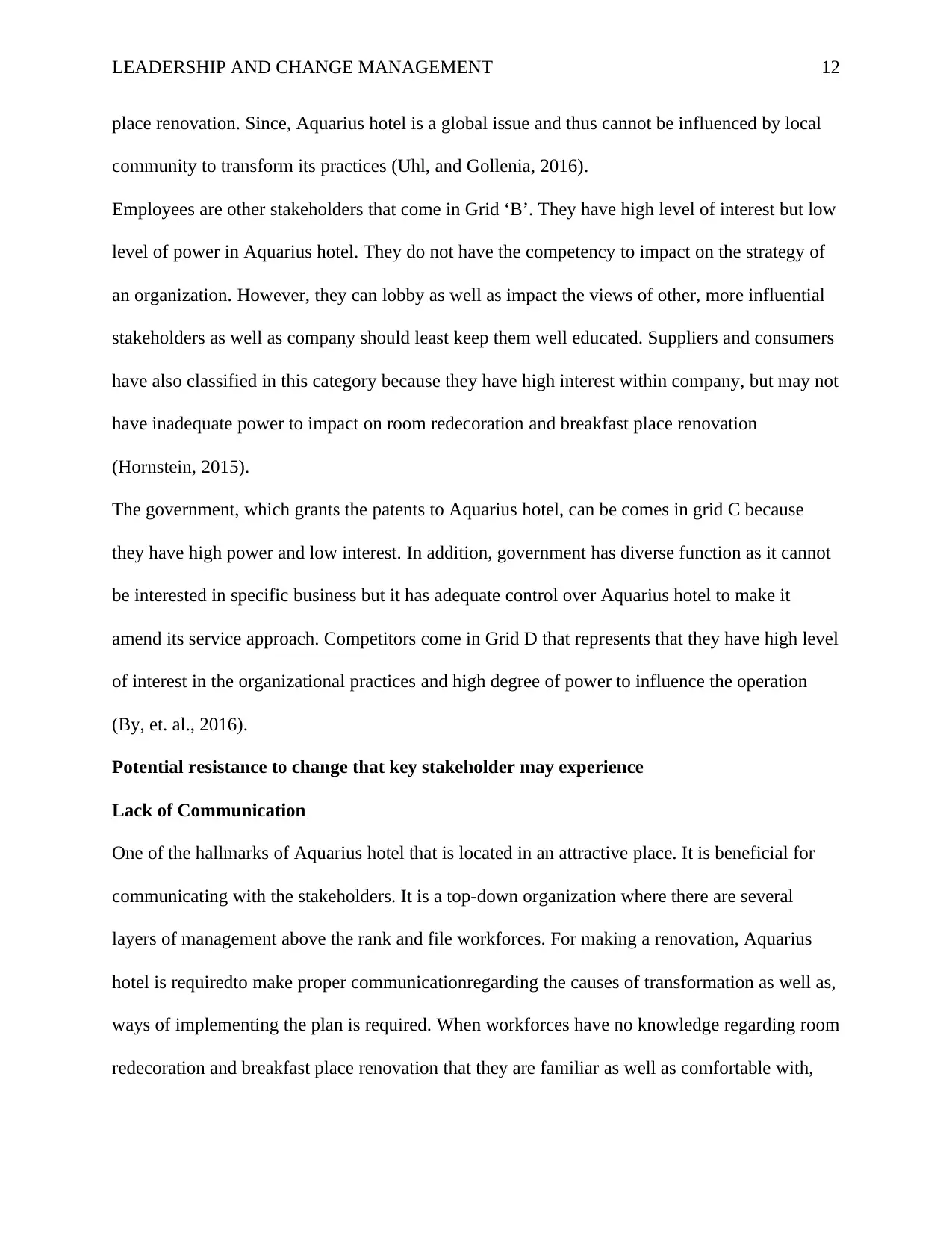
LEADERSHIP AND CHANGE MANAGEMENT 12
place renovation. Since, Aquarius hotel is a global issue and thus cannot be influenced by local
community to transform its practices (Uhl, and Gollenia, 2016).
Employees are other stakeholders that come in Grid ‘B’. They have high level of interest but low
level of power in Aquarius hotel. They do not have the competency to impact on the strategy of
an organization. However, they can lobby as well as impact the views of other, more influential
stakeholders as well as company should least keep them well educated. Suppliers and consumers
have also classified in this category because they have high interest within company, but may not
have inadequate power to impact on room redecoration and breakfast place renovation
(Hornstein, 2015).
The government, which grants the patents to Aquarius hotel, can be comes in grid C because
they have high power and low interest. In addition, government has diverse function as it cannot
be interested in specific business but it has adequate control over Aquarius hotel to make it
amend its service approach. Competitors come in Grid D that represents that they have high level
of interest in the organizational practices and high degree of power to influence the operation
(By, et. al., 2016).
Potential resistance to change that key stakeholder may experience
Lack of Communication
One of the hallmarks of Aquarius hotel that is located in an attractive place. It is beneficial for
communicating with the stakeholders. It is a top-down organization where there are several
layers of management above the rank and file workforces. For making a renovation, Aquarius
hotel is requiredto make proper communicationregarding the causes of transformation as well as,
ways of implementing the plan is required. When workforces have no knowledge regarding room
redecoration and breakfast place renovation that they are familiar as well as comfortable with,
place renovation. Since, Aquarius hotel is a global issue and thus cannot be influenced by local
community to transform its practices (Uhl, and Gollenia, 2016).
Employees are other stakeholders that come in Grid ‘B’. They have high level of interest but low
level of power in Aquarius hotel. They do not have the competency to impact on the strategy of
an organization. However, they can lobby as well as impact the views of other, more influential
stakeholders as well as company should least keep them well educated. Suppliers and consumers
have also classified in this category because they have high interest within company, but may not
have inadequate power to impact on room redecoration and breakfast place renovation
(Hornstein, 2015).
The government, which grants the patents to Aquarius hotel, can be comes in grid C because
they have high power and low interest. In addition, government has diverse function as it cannot
be interested in specific business but it has adequate control over Aquarius hotel to make it
amend its service approach. Competitors come in Grid D that represents that they have high level
of interest in the organizational practices and high degree of power to influence the operation
(By, et. al., 2016).
Potential resistance to change that key stakeholder may experience
Lack of Communication
One of the hallmarks of Aquarius hotel that is located in an attractive place. It is beneficial for
communicating with the stakeholders. It is a top-down organization where there are several
layers of management above the rank and file workforces. For making a renovation, Aquarius
hotel is requiredto make proper communicationregarding the causes of transformation as well as,
ways of implementing the plan is required. When workforces have no knowledge regarding room
redecoration and breakfast place renovation that they are familiar as well as comfortable with,
⊘ This is a preview!⊘
Do you want full access?
Subscribe today to unlock all pages.

Trusted by 1+ million students worldwide
1 out of 19
Related Documents
Your All-in-One AI-Powered Toolkit for Academic Success.
+13062052269
info@desklib.com
Available 24*7 on WhatsApp / Email
![[object Object]](/_next/static/media/star-bottom.7253800d.svg)
Unlock your academic potential
Copyright © 2020–2026 A2Z Services. All Rights Reserved. Developed and managed by ZUCOL.



